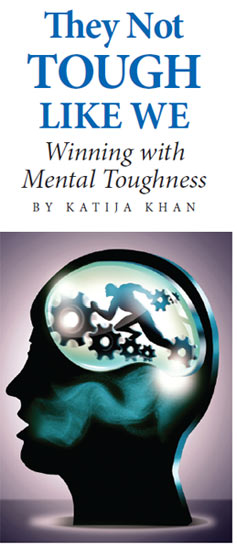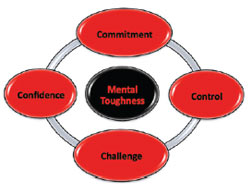
Usain Bolt’s iconic posturing, Mohammed Ali’s braggadocious repartee, George Bovell’s composed steadfastness and Brian Lara’s stylistic stamina—what do they have in common?
Long before psychologists coined a term for it, the best athletes knew that success required more than fitness and skill. That extra edge was not physical, but mental. As John Hall puts it, “The fitness must be there, but the mind is paramount to performance.”
So where does this extra edge come from? What do the four athletes mentioned all manifest? The answer is mental toughness. It is what makes an athlete succeed despite odds that might defeat another.
The concept of mental toughness has become increasingly popular in sports in the past couple of decades. Despite its growing ubiquity in the sports arena, mental toughness is still thought to be poorly conceptualised. In their book, “Developing Mental Toughness,” Clough and Strycharczyk describe it as “the quality which determines in large part how people deal effectively with challenge, stressors and pressure... irrespective of prevailing circumstances.”
Mental toughness should not be confused with extraversion or flamboyance. There are four components: Control (Life and Emotions), Commitment, Challenge and Confidence (interpersonal and ability). All four Cs conspire to make the athlete mentally tough.
Research has consistently shown that mental toughness in athletes is associated with performance, aspirations, physical endurance, pain tolerance, coping, well-being and optimism. In one study which looked at rehabilitation, athletes with higher mental toughness believed they were less susceptible to further injury and were better able to cope with pain. They also had better attendance at rehabilitation sessions and better adherence to procedures both at the clinic and while at home.
So, are people born mentally tough?
The answer is both yes and no. Some people may have a personality that inclines them to be more mentally tough but this does not mean you either have it or not. Mental toughness is what is called a ‘plastic personality trait’; this means that it is amenable to change and we can develop it in persons. They can be trained to recognize, deal with and cope more effectively with stress in their lives.
At UWI, we are interested in finding out how this concept applies to our local and regional athletes and how it can best be used by psychologists, coaches, trainers and athletes. We chose a measure—the Mental Toughness Questionnaire (MTQ-48) that was derived through extensive international research and set out to validate it in Caribbean athletes. In the first part of the research project, we looked at male footballers at different levels of competition: the Pro-League and the Eastern (Third) Division. The athletes filled out questionnaires on resilience and athletic coping skills and also gave a self estimate of their mental toughness. In addition we had coaches complete a Coach Rating Scale for each athlete.
Players in the Pro-League had slightly higher levels of mental toughness than players in the lower division, and this is consistent with other research that suggests mental toughness increases with the level of competition. As expected, resilience was strongly associated with mental toughness, as the concepts are related. Coach ratings and self estimates were also good predictors of mental toughness.
This shows that players have a good sense of their own level of mental toughness. However, when examined in more detail, player estimates were only associated with the component on Control of Emotions. This suggests a narrow conceptualization by players and represents an avenue for further development, to make them aware of the different components and why these are also critical to success.
We also looked at the relationship between education and years playing football with mental toughness. Experience was not related to mental toughness but education was associated with two components: Challenge and Commitment. This is also a critical finding as it suggests that athletes who have had limited schooling may need further training and development through honing their ability to deal positively with obstacles and improve their “stick-ability,” that is, committing to their work and goals. These initial results are very promising as they help identify areas that can distinguish low and high mentally tough athletes. The study is ongoing and the next steps are to look at mental toughness in female athletes, other sport disciplines and also to compare British and Caribbean athletes to see if there are cultural differences in mental toughness.
Mental toughness is an important concept that can be used to develop and enhance athletes’ performance, well-being and aspirations. Our ongoing research will help to refine its use and applicability in the Caribbean.
Finally, as the Brazil World Cup finals approach, memory harkens back 25 years, to the excruciating near miss of the Strike Squad’s efforts to reach the finals of the Italy World Cup. Despite the outcome, few will deny the team’s (and the ensuing redemptive Soca Warriors’) embodiment of the four Cs of mental toughness. Indeed, we (Caribbean academics and researchers) are only now beginning to fully investigate this essence that was captured so insightfully in Sound Revolution’s classic song: “Football Dance.”
“They believe them ah rough (x2)
But they not tough like we (x2)
Cause anytime we come, we come dangerous
And anytime we come we come cantankerous
Trinbago is so good we make them so nervous
Cause when we have to play we make them fraid of us”
Football Dance, Sound Revolution, 1989
The 4 Cs of Mental toughness

| Control |
Life Control: I have control over what happens to me. I can shape my destiny
Emotional Control: I can manage my and others’ emotions |
| Challenge |
Life’s obstacles are challenges to be met rather than threats. I will push myself to try harder. |
| Commitment |
I am fully involved and will give it my best shot. I’ll do what it takes to achieve my goals. |
| Confidence |
Ability: I can do it or I can acquire the skills to do it
Interpersonal: I can influence others. I can stand my ground when needed. |
Dr Katija Khan, Lecturer in Clinical Psychology at the Psychiatry Unit, Clinical Medical Sciences, UWI, presented a version of this paper at the January conference, “Science, Higher Education and Business: An Interdisciplinary Approach to Sports Studies, Research and Development. Jointly arranged by The UWI, First Citizens Sports Foundation and The Sports Company of Trinidad and Tobago Limited, the conference was designed to initiate discourse on both the development of sports and the use of sport for development.
|





